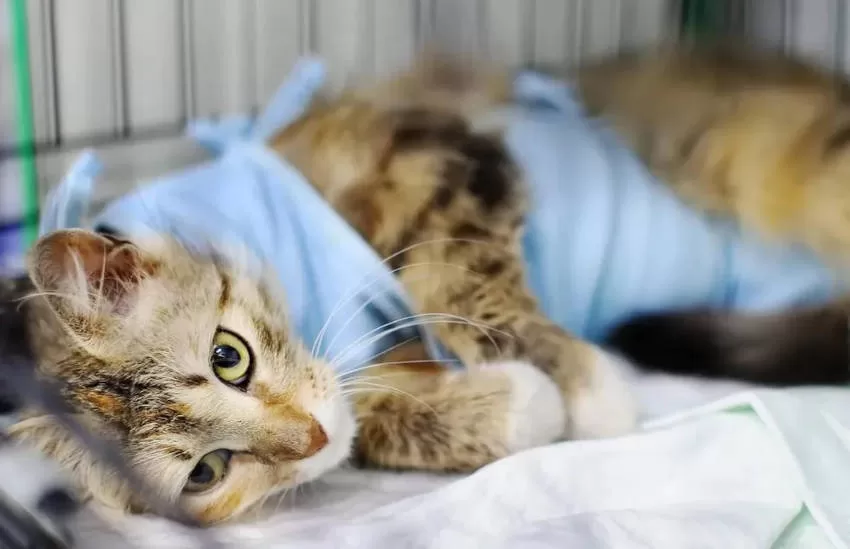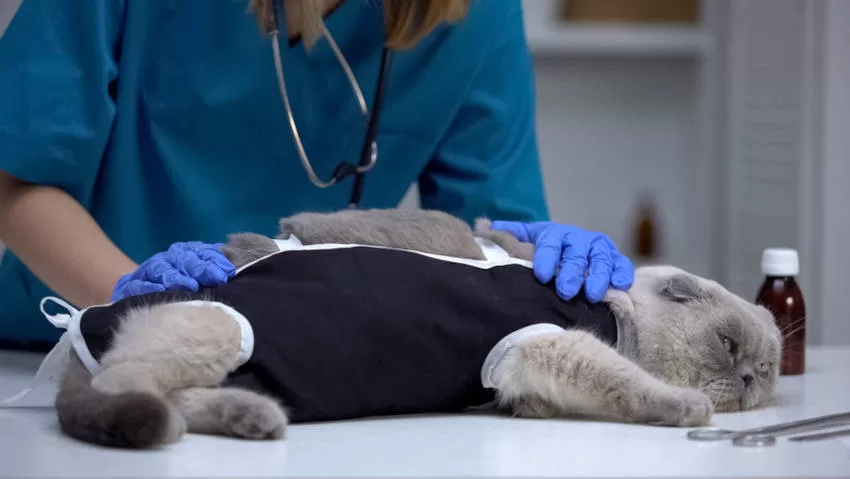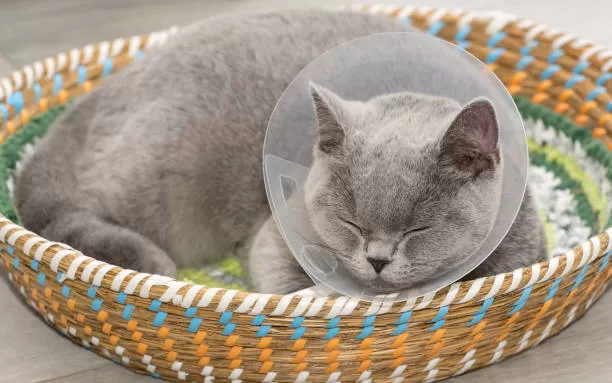Many benefits of neutering cats for health, well-being and behavior can be obtained after surgery. Neutered cats have fewer behavioral problems, such as marking territory and scratching furniture, and tend to live longer than unneutered cats. Additionally, neutering may reduce the risk of certain sex-related diseases, such as testicular and prostate cancer.
Knowing the Benefits of Neutering Cats
Neutered Cat Behavior – Benefits of Cat Neutering for Health, Welfare and Behavior
Cats are wonderful, adorable animals, but they can also be quite tricky. If you are a cat owner, then you have probably learned this for yourself. One of the main problems cat owners face is their pet’s behavior. Cats can be very stubborn and difficult to control, which can make life quite difficult for their owners.
However, there is a solution to this problem: neutering cats. Neutering is a relatively simple surgery that can do wonders for your pet’s behavior. In addition to benefiting your cat, neutering also brings many benefits to your cat’s health and well-being.

Male cats, in particular, tend to be quite aggressive and territorial. They can make a lot of noise and be quite destructive when they are not neutered. Neutering will significantly reduce your cat’s aggression and will also make him calmer and calmer. He will also stop urinating around the apartment and marking his territory with his feces.
Female cats can also benefit from neutering, especially if they are very agitated and vocal during heat. Neutering will reduce your cat’s agitation and will also stop her from urinating all over the house. Additionally, neutering your cat will prevent her from getting other cats pregnant, which can be a big problem if you’re not prepared to care for a nest of kittens.
Neutering is also very beneficial for your cat’s health. Male cats that are not neutered are at risk of developing testicular tumors as well as problems with the prostate. Female cats that are not spayed or neutered have a higher risk of developing tumors in the ovaries and uterus. Neutering will significantly reduce the risk of developing tumors in both sexes.
Additionally, neutering prevents cats from being seriously injured in fights with other cats, which can lead to death. Female cats are also susceptible to serious uterine infections, called pyometra, which can be fatal if not treated properly. Neutering prevents cats from developing pyometra, as it removes the reproductive organs where the infection can develop.
While neutering may seem like a scary surgery, it’s important to remember that it is a relatively simple and painless surgery that can bring many benefits to your cat’s health and well-being. If you are concerned about your pet’s behavior, then neutering is certainly worth considering.
Long-Term Health: Protecting Your Cat with Neutering
Neutered Cats Behavior:
Neutering male cats is a simple sterilization surgery that provides numerous benefits for your pet’s health and well-being. In addition to preventing unwanted reproduction, neutering can improve your cat’s behavior and help him live longer.
Since the early 1990s, neutering of domestic cats has become increasingly common. As a result, there has been a significant reduction in the population of cats on the streets and in animal shelters. Neutering is also an effective way of controlling the cat population, as neutered cats have less reason to run away from home in search of a mate.

Benefits of neutering your cat:
Prevents unwanted reproduction: Neutering prevents your cat from engaging in unwanted behaviors, such as urinating and marking territory outside the litter box, scratching furniture and even running away from home.
Reduces the risk of diseases: Unneutered cats are at greater risk of contracting diseases of the reproductive system, such as testicular and prostate tumors. Neutering can also reduce the risk of other diseases, such as bladder cancer and feline immunodeficiency virus (FIV).
Improves behavior: Unneutered cats tend to have more aggressive behavior and may be more prone to fights with other cats. Neutering can help reduce your cat’s aggression and make him more docile.
Stimulates well-being: Neutered cats live longer compared to unneutered ones and tend to have fewer health problems. Additionally, neutered cats are less likely to run away from home, which can reduce your pet’s stress.
Don’t forget to take your cat to be neutered! Neutering is a simple and safe surgery that offers numerous benefits for your pet’s health and well-being. Consult your veterinarian to learn more about neutering and how it can benefit your cat.
Disease Prevention Measures in Neutered Cats
Neutered cats have a lower risk of contracting diseases, as their behavior is different. They are not as active and do not have the habit of urinating outside the house. However, castration does not protect them from all diseases. Vaccinations are important for the health of cats and should be considered as a disease prevention measure. Some diseases that affect cats, such as feline leukemia and feline immunodeficiency virus, are highly contagious and can be easily transmitted to other cats. Castration reduces the risk of contracting some of these diseases, but it is not a foolproof measure. The best way to protect your cat is to keep him indoors and ensure he receives regular vaccinations against the most common diseases.

Neutering Prevents Infectious Diseases in Cats
Many cat owners are unaware that neutering their cats can protect them from infectious diseases. Neutering is one of the main ways to control cat reproduction and, consequently, one of the most effective ways to prevent infectious diseases.
Unneutered cats have more aggressive behavior and are more likely to fight with each other. When cats fight, they can get hurt and be exposed to bacteria and viruses. Furthermore, unneutered cats have a strong territorial marking instinct, which leads them to urinate in places to mark their territory.
Urinating in public places increases the chances of cats being exposed to infectious diseases such as feline leukemia and feline immunodeficiency. Furthermore, unneutered cats are also more likely to roam and, consequently, cross streets and parks in search of a mate.
This significantly increases the chances of a cat being run over or involved in other traffic accidents. Cats that are run over or involved in other accidents can suffer serious injuries and, consequently, be exposed to bacteria and viruses.
Neutering is one of the main ways to control cat reproduction and, consequently, one of the most effective ways to prevent infectious diseases. Neutering male cats inhibits aggressive behavior and territorial marking. Furthermore, neutering male cats prevents them from crossing streets and parks in search of a mate.
Neutering male cats significantly reduces the chances of them being exposed to infectious diseases, being run over by a car or being involved in other accidents. Furthermore, neutering male cats prevents them from reproducing and, consequently, infectious diseases from being transmitted to other cats.
Neutering Cats Improves Their Behavior
Cats are beautiful, elegant and enigmatic. They are the perfect pets for many people. However, cats can become a problem when they are not neutered.
Unneutered male cats are known for urinating all over the house, scratching furniture, and even being aggressive. Fortunately, neutering can solve all of these problems.
Neutering male cats is a simple surgery that removes the cat’s huevas. This causes the cat to be less aggressive and urinate less. Neutering also prevents cats from mating and, consequently, prevents the proliferation of cats in your neighborhood.
In addition to being beneficial for the cat, neutering is also beneficial for the owner. Neutered cats are easier to care for and require less care than their unneutered counterparts.
If you have a male cat and are considering neutering, it is important to speak to a veterinarian to learn about the risks and benefits of the surgery. However, in general, neutering is a great way to improve your cat’s behavior and make him an easier pet to care for.
Less Territorial Behavior in Neutered Cats
Like all cats, neutered males have a natural instinct to mark their territory. This means that they often urinate in places where they can leave their olfactory mark. However, neutering a male cat significantly reduces this behavior.
Neutered cats are less likely to mark their territory with urine, but that doesn’t mean they won’t do it. Castration only reduces the intensity of the behavior. If your male cat is urinating in places outside of the trash can, he is likely marking his territory.
In addition to urinating to mark their territory, male cats also tend to scratch places with their nails. Neutering also reduces this behavior, but does not eliminate it completely. If your neutered cat is scratching furniture or doors, it is likely marking its territory.
To further decrease your neutered cat’s territorial behavior, you can try some of the following strategies:
– Provide him with a very clean and ventilated trash bin.
– Provide him with a vertical scratching post so he can scratch without damaging furniture.
– Regularly clean the areas where your cat urinates and defecates, so that they do not have an odor.
– Take your cat for a walk on a leash and allow him to explore the area around your home.
– Play with your cat regularly so that it feels mentally and physically stimulated.

Castrated females do not suffer from reproductive diseases
Cats are beautiful, loving animals and full of personality. Unfortunately, many of them suffer from reproductive diseases such as ovarian cancer and endometriosis. These diseases can be very painful and sometimes even fatal. Fortunately, there is a way to prevent them: castration.
Castration is a surgical procedure that removes a cat’s reproductive organs. It is very effective in preventing reproductive diseases and, in addition, it also has other benefits. For example, it reduces the sexual behavior of cats and, consequently, prevents them from being attacked or injured by other cats during fights. Additionally, neutering also prevents female cats from having unwanted litters.
Neutering is a very safe and simple procedure, and cats usually recover quickly. Furthermore, it is very cheap, especially compared to the costs of treating reproductive diseases. For all these reasons, it is extremely important that female cats are neutered, especially if they do not intend to reproduce.
Unfortunately, there are still many cat owners who are unaware of the benefits of neutering. Many of them think the procedure is unnecessary or even dangerous. Still others believe that neutered female cats become sick or suffer from depression. None of this is true! Neutering is a safe and effective procedure that can save the lives of many cats.
If you have a female cat and have not yet spayed her, contact a veterinarian and make an appointment. He will be able to clarify all your doubts about the procedure and, if necessary, perform the surgery. Remember: neutering is the best way to prevent reproductive diseases in female cats. It could save your pet’s life!
Neutering Reduces Stress in Cats
Cats are animals that have a very strong territorial marking instinct. They do this by urinating in their territories to leave their scents. When a cat is not neutered, it can cause a lot of stress, especially if there are other cats around. Castration reduces this need for marking and, consequently, the associated stress.
Reducing the Level of Risk and Stress in Neutered Cats
Cats are fascinating and adorable animals. They can be independent and at the same time affectionate, playful and loving. They are very popular as pets and have a special place in many people’s hearts. Unfortunately, cats can also be very stressed and anxious. Stress can cause health and behavioral problems and even lead to death. Neutering is one of the most effective ways to reduce stress and the risk of disease in cats.
Cats are territorial animals and mark their territory by urinating and defecating. When a cat is not neutered, it will continue to mark its territory very frequently. This can be very stressful for the cat and can also cause problems in the home, such as unpleasant odors. Neutering reduces the cat’s desire to urinate and defecate outside of the crate, which can reduce the animal’s stress.
Cats are also quite territorial towards other cats. When a cat is not neutered, it can become aggressive towards other cats, especially males. This can lead to fights and sometimes even death. Neutering reduces the cat’s aggressiveness and therefore the risk of fights and injuries.

In addition to aggression, unneutered cats also tend to urinate in places outside of the litter box, especially in the presence of other cats. This can lead to urinary tract disease and other health problems. Neutering reduces the urge to urinate outside the crate and therefore the risk of disease.
Unneutered cats are also more susceptible to disease than neutered cats. This is due to the fact that unneutered cats have much more testosterone in their blood, which can make them more prone to diseases. Neutering reduces the amount of testosterone in the cat’s blood and therefore the risk of disease.
Neutering can also help keep the animal calm and relaxed. Neutered cats tend to be calmer and more relaxed than unneutered cats. This is due to the fact that neutering reduces the amount of testosterone in the cat’s blood, which can make him calmer.
Neutering is one of the most effective ways to reduce stress and the risk of disease in cats. In addition to reducing stress, neutering can also help keep the animal calm and relaxed.
The Benefits of Neutering Cats for the Animal’s Health, Wellbeing and Behavior
The Benefits of Neutering Cats for the Animal’s Health, Wellbeing and Behavior
As cat owners, we want what’s best for our cats. This includes a healthy diet, annual check-ups and, if necessary, surgery to correct health problems. It is also important to consider neutering your cat. Although neutering is a relatively simple procedure, many cat owners still have questions about whether or not they should neuter their cats. Here are some of the benefits of neutering cats for the animal’s health, well-being and behavior:
Neutering can prevent testicular cancer, a common problem in male cats. Testicular cancer is a malignant tumor that affects a cat’s testicles. If left untreated, the cancer can spread to other parts of the body and lead to death. Castration can also prevent other testicular tumors, including human-like tumors called Leydig cell tumors.
Neutering also reduces the risk of other diseases common in male cats, such as prostatitis. Prostatitis is an inflammation of the prostate, which is a gland located between the testicles and the rectum. Prostatitis can cause pain and discomfort, as well as difficulty urinating and defecating. If left untreated, prostatitis can become chronic and lead to kidney failure.
Another disease that can be avoided with castration is uveitis, which is an inflammation of the uvea, which is the white part of the eye. Uveitis can cause eye pain and swelling, as well as blurred vision or vision loss. If left untreated, uveitis can lead to blindness.
In addition to the health benefits, neutering can also improve your cat’s behavior. Many male cats are calmer after neutering, which can be a benefit to owners who are tired of their constant playful cats. Neutering can also reduce territorial marking, where male cats urinate throughout the house to mark their territory.
Neutering can also prevent male cats from roaming outside looking for females to mate with. In addition to the danger of crossing the streets, male cats are also at risk of being attacked by other male cats when they are looking for a mate. Male cats are also more likely to run away from home when there are females in heat nearby. By neutering your cat, you can prevent him from wandering outside and exposing himself to these risks.
Neutering can also help maintain a calmer environment at home if you have more than one cat. Male cats are notoriously territorial and may fight with each other to establish hierarchies. This can lead to serious injury and even death. By neutering your cats, you can reduce these fights and allow everyone to live in harmony.
As you can see, there are many health, welfare and behavioral benefits to neutering cats. If you are considering neutering your cat, consult your veterinarian for more information.
External Links:

